Juleah | Interview
Juleah, which is actually Julia Hummer, is back with her new album ‘Desert Skies’, an enchanting hypnotic bit of sonic wanderlust with deep roots in the genres of blues, dream-pop and psychedelic manifestations.
Juleah’s music is always compelling, belaying a sense of emancipation, delivered with a bit of swagger, where Julia’s vocals don’t stand in juxtaposition to the music, rather they’re intrinsically part of the sound she rolls out with an eloquent ease and grace, creating a warm atmosphere of raptured freedom.
Instantly obvious, is the passion and originality found within these hazed grooves, were one well crafted song surfaces after another, washed in reverb and drenched with layered guitar chords that are nearly visually lush. All of this material has been distilled from pure deep waters, where the numbers found on this limited edition album (100 copies) of translucent turquoise splatter vinyl will delight your eyes as much as your ears.
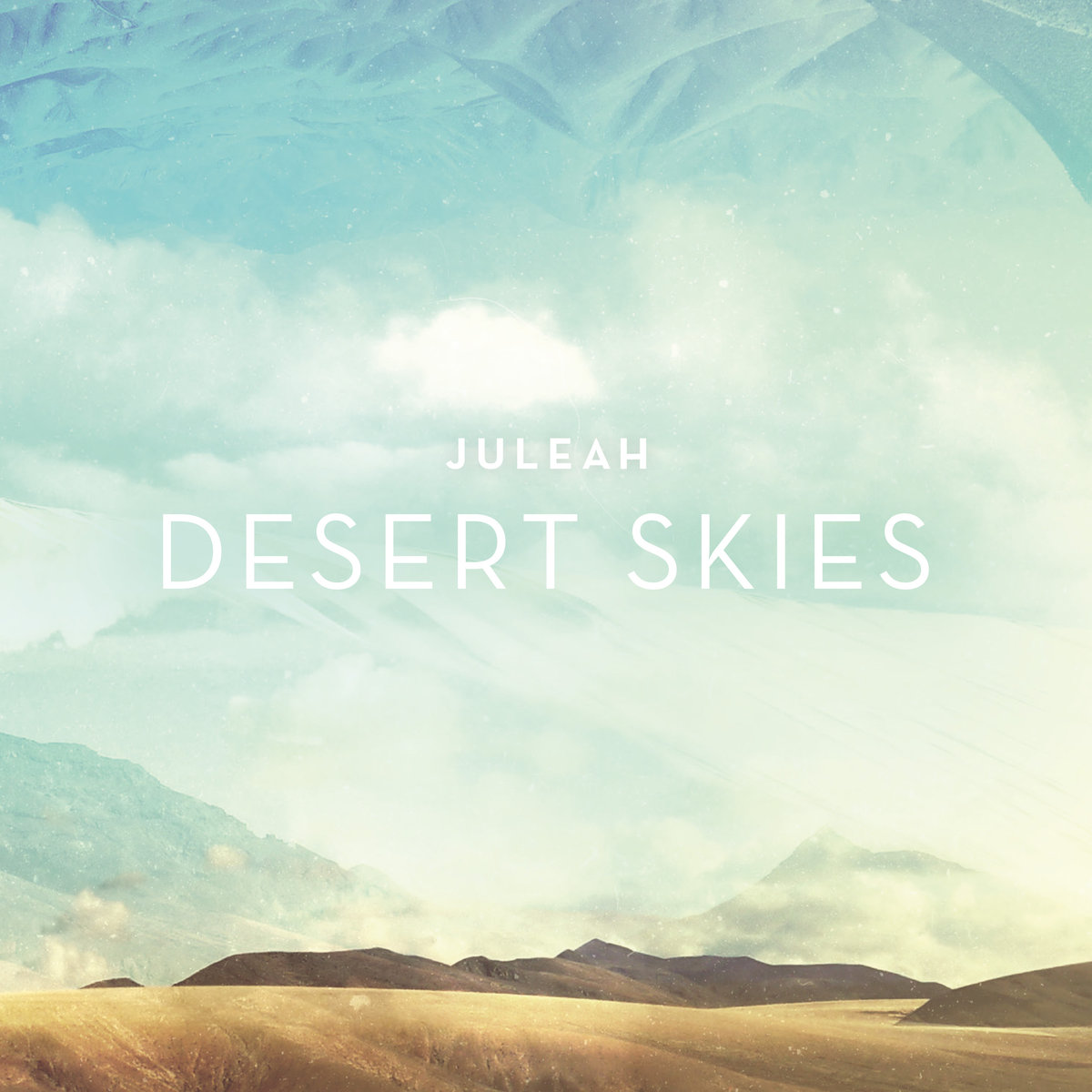
While Juleah’s music goes down best just after sunset, right before the long orange fingers of the setting sun disappear below the horizon … this time out, Juleah presents a few tracks that are more light handed in their nature, yet are equally as fulfilling and delightfully romantic, riding easy in the back pocket of my most weathered jeans.
Tonight I have the pleasure of sitting down with Julia Hummer, who’s adopted the project name of Juleah, a fine neo-psych bluesy artist from Austria. Her latest album is entitled ‘Desert Skies’, and if you haven’t heard it, you should.
“I’m constantly zooming in, working on little details”
Jenell: Julia, thanks for taking the time to sit down with me. Are you excited about the new album?
Julia: Yes, release time is always great. It’s a great to close very big chapter which makes room for a lot of new things and ideas. Big relief!
Jenell: (laughing) I watched the video for the song ‘Kahlua’, seems you were in the American southwest and you didn’t swing by my place.
Julia: Not quite, but you guessed the right climate zone. I filmed this on the canary island Lanzarote. The landscape there is fascinating, you got volcanos, desert, beaches and the sea and all sorts of subtropical plants like cactuses. And the weather is always nice … apart from the very strong wind. It’s funny you’re saying that though because recently I read much about the American southwest and northern Mexico area. Arizona, New Mexico, Sonora Desert, Baja California … all this are places that I would love to visit someday. And California of course. Although I’m very sensitive to sunbeams, this vegetation seems like my cup of tea out of some reason.
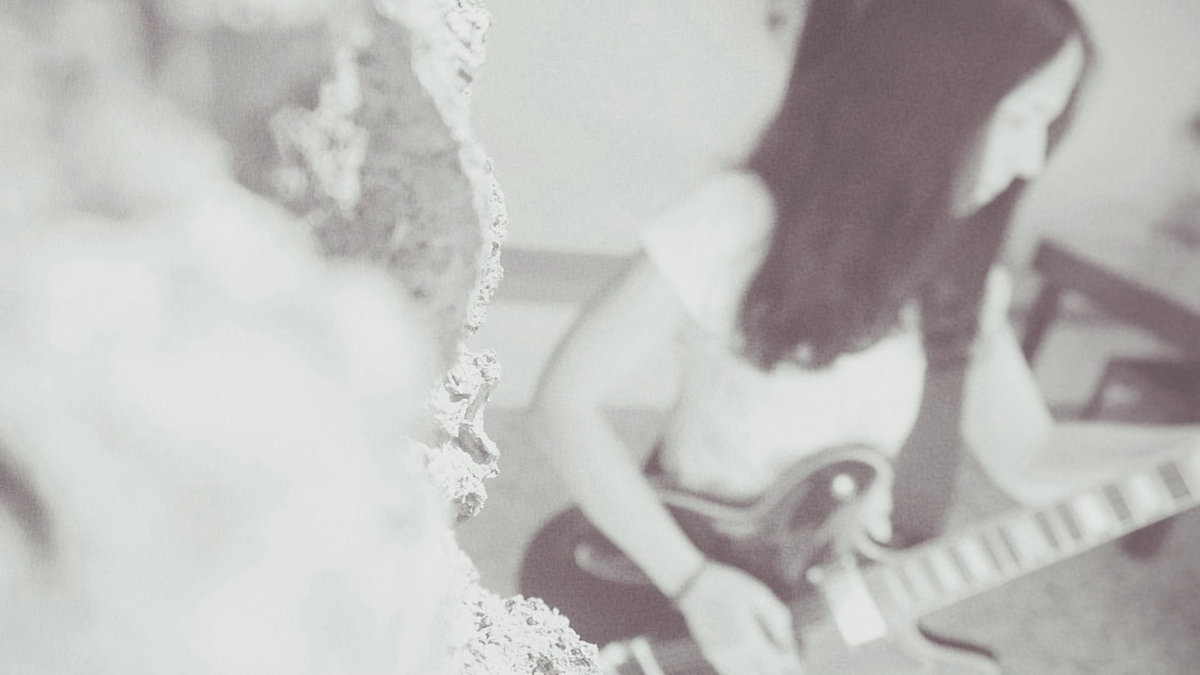
Jenell: Are you a classically trained musician? Do you come from a musical family?
Julia: If you mean classically trained in the sense of an academic music degree then no. But I had lessons in classical guitar from age 8 to 19. Yes, there are a lot of musically talented people in my family. Almost everyone did learn an instrument at some point.
Jenell: Your sound is far more than layered, instruments weave in and out of each other. Does your ability to play more than one instrument lend itself to this concept? And to that end, are you considering wrapping a full-time band around yourself, or do you enjoy the freedom that comes from picking musicians in reference to specific projects?
Julia: I see every instrument as being equally important in a song. Of course, as listeners we first notice the vocals and maybe the guitars, but this is due to the way our perception works. Yet on a more subconscious level and for the feeling in our body, bass and drums are equally important creating a good song as a whole. Over the years I had different ideas of how Juleah might work by including other musicians. I know now that it only works for me when the creative part stays with me and the band helps me to play the songs live. With Henry, Alex and David I found musicians who are happy with that concept. I am very thankful for this, otherwise there wouldn’t be Juleah-live concerts, as I wouldn’t have the courage to go on stage alone.
As far as picking musicians for specific projects, I can well imagine them helping me play parts on the recordings, for example, my friend Constantin Du Closel plays on the new record, holding down the drums on ‘Black Vanilla’.
Jenell: Some artists delight in making the music, while others seem to delight in playing live … do you discover new aspects of your songs developing in front of an audience?
Julia: Both things are great, but if I were forced to decide between these two, I’d pick the ‘creating’ part, both in the studio and at home. The adrenaline rush on stage is wonderful, though I find it more satisfactory to have something finished to enjoy over and over again. I love being able to express ideas via packing them into the sound of a 3 or 4 minute song. These things would be so difficult to express in other ways. It’s also liberating, cathartic … and very satisfying. Even more when you can hold a CD or vinyl in your hands.
Yes, the songs really come to life in a whole new dimension when we play live, and there’s always this magic point in rehearsal when all of the parts start to flow harmonically together. Every band member brings their own style of playing which makes it very exciting to see how the song will turn out, which song works better and which one not so well. If something is uncomfortable for my band members to play, we search ways it could work in order that everyone enjoys playing the song.
Jenell: You have a rather large body of work to draw from for live settings, are you surprised when fans ask to hear older numbers?
Julia: To be honest, this has never happened until now. Only one time I was told me after a gig that he missed ‘Strom Aus Licht’. However, several members of my live band asked why we don’t play ‘Anticipation’, with the reason being that we’d need an organ an acoustic guitar and two electric guitars to do it properly, otherwise the song won’t really work live.
Jenell: Have other women influenced you, artists such as Sue Foley? And please, take a moment to talk about music that’s had an effect on your sound.
Julia: I want to start with the second part of the question. I started to become a really big music fan in 1997 with the Oasis album ‘Be Here Now’. From then on I started to build out a strong attraction to the British rock music of the early 90’s. I loved Madchester, Britpop and also some Shoegaze. So I would say that these are my main influence. The fascination for psychedelic music started later, in the early 2000’s with Black Rebel Motorcycle Club and then later The Black Angels. I also got into 60’s psych bands like The Doors at that time.
Regarding the first part of the question, for the initial influences, I have to say no, and actually when I think about it, this is really sad. I thought a lot about the reason for this, where I could give a really loooong feminist answer, but I’ll keep it short and just say that I hope that female musicians will start to rely more and more on themselves, draw their self-esteem out of their talents and not so much out of their looks, and by so doing the problem will be erased automatically. In the meantime there are some woman that I admire, for example the two female drummers of Black Rebel Motorcycle Club and The Black Angels, I love them both so much.
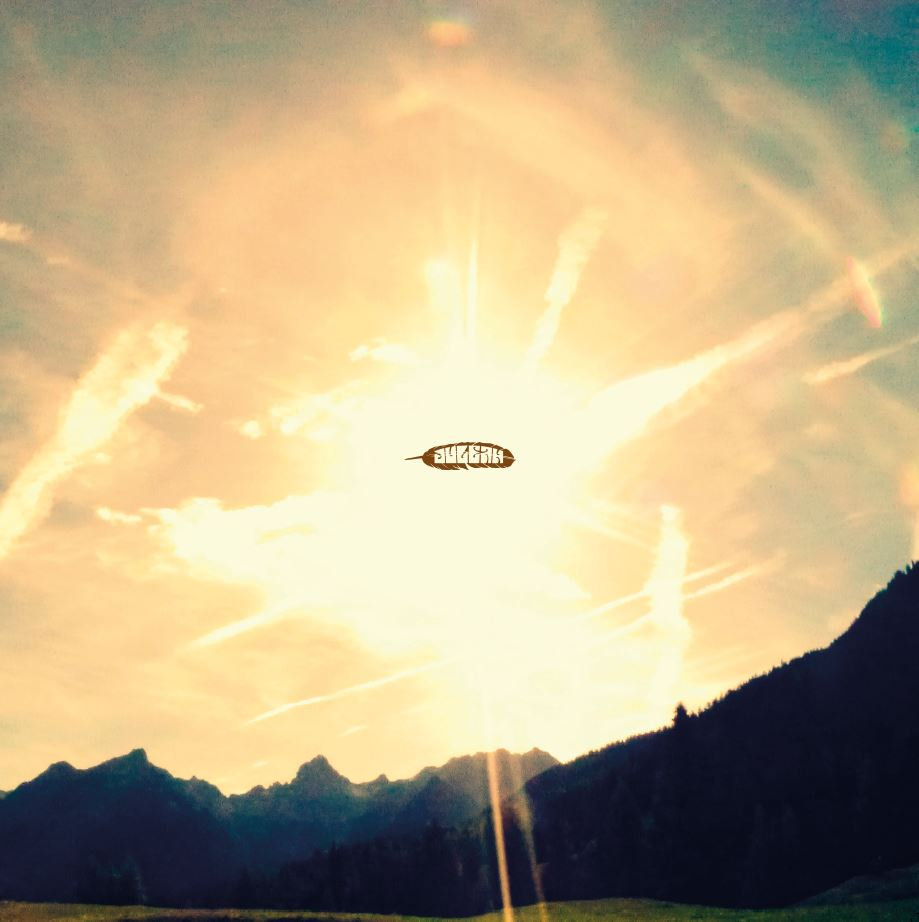
Jenell: Who’s on your turntable right now? And what is your most prized record?
Julia: At the moment it’s International Music with their album ‘Die Besten Jahre’ … I can sincerely recommend that one.
Prized, in a material way, it’s a limited red vinyl edition of ‘Specter At The Feast’ by Black Rebel Motorcycle Club , I grabbed that one on Discogs. On a personal level I’d say ‘Here Eye Go’ by Golden Animals, ‘New Candys As Medicine’ by New Candys, and ‘Fortune, Shelter, Love and Cure’ by Suns Of Thyme. The reason I’ve chosen these is because I’ve had amazing concert experiences associated with these records.
Jenell: Your vocals don’t stand in juxtaposition to the music, they’re not simply laid over top, but seem to be enveloped by the music, as if the mere sound of your voice is integral to every other note.
Julia: That’s cool that you perceive it like this because that’s how it was intended. I think that’s common in psych music anyway and probably the reason why my Aunt Hildegard is forever complaining about the concerts, saying “I couldn’t hear your voice”.
To be fair, it’s not easy to get so much done correctly live. Of course the vocals should be clearly hearable, but not too much. I think this is one of our main challenges in the future for live performances. And to that end we now have someone to help us with this aspect.
Jenell: Your voice floats in a low-keyed manner with a bit of swagger to it, when considering your other releases, those vocals seem to have gotten more intimate and more refined. Have you been working on your vocal presence?
Julia: Yes, I took some vocal and singing lessons over the last few years, I very happy with the results … my vocal strength is much improved. The only thing I did deliberately on the new record is shaping the vocal sound into a more megaphone-like direction, cutting most of the really high frequencies off, making things a little more lo-fi. When there are too many bright frequencies, the music begins to sounds too pop-ish for me, meaning my voice would be too front and center.
Jenell: I was delighted to see you using a 12-string, that guitar simply creates and intoxicating jangle sound.
Julia: There was I time when I wanted to use that guitar on every single song. But the 12 string isn’t suitable for everything. It occupies a great deal of space … demanding far too many high frequencies, especially when there are two guitars, which makes for a challenge at the time of mixing.
Jenell: For the technical geeks, would you please speak to your guitars and the effects pedals you employ?
Julia: At the moment I use a Fender Jazzmaster as my main guitar, while previously, for a very long time, I used an old Fender Jaguar. I will have to decide between these two for stage presence, otherwise I’d have four guitars to switch back and forth from, and that’s just a little over the top.For at least one song I will use the Hagstrom Viking deluxe on stage, which I’ve owned forever, yet recently sold to my guitarist Henry who will use it on stage. We now have, and in the future even more so, some switches of guitars, regarding the necessity of guitar sounds which varies for each number. But then, I can always rely on the aforementioned 12 string Danelectro. Regarding effects, the most important pedals for me are a compressor, tape delay and plate reverb. For some songs, and especially in the mixing, I really tend to use tape saturation. For other parts I need an overdrive pedal to produce tremolo. Everything goes into a Fender Amp. So that’s about it.
Jenell: Is your material set in stone by the time you record, or is it an ever-evolving process? Are there any songs from your past that you’d like to revisit or rework?
Julia: The concept of the song, the rhythm and mood, is set in stone, and soon after that also the structure. Everything else is a matter of experimenting. I don’t go with the first obvious ideas, I tend to take time and try things out until I find something that sounds fitting and-or interesting, making sense for the overall concept of the song. This principle applies for every single instrument.
Sometimes I simply just jam over some pre-recorded tracks, where afterwards, when I listen back, I pick out parts that sound awesome. For most songs, not for all of them, I like the approach of classical songwriting where there’s a suspense curve and dynamic in the song. It’s a very intuitive workflow. Basically, songwriting, recording and mixing oftentimes overlap, as I can’t hold myself back from improving the mix from the beginning to the end. It’s quite chaotic.
Everything takes too much time for me. I’m constantly zooming in, working on little details in a very hectic manner, and them zooming out in order to listen to everything as a whole. All of this, from the first recordings until the finished song takes an awful lot of time, an immense amount of discipline and patience. I have noticed that, even if I am on holiday from work, I’m not that much faster in producing because of the many pauses that are necessary in my creative process. I even did the mastering myself which is quite crazy. In general, doing everything alone is insane and I can’t imagine doing another record like this. For ‘Desert Skies’ there were reasons why I stuck to the “never change a running system” method. When I do another album, I want the music to evolve a step further via being enriched by the skills of other peoples, maybe for recording, but most likely for mixing and mastering.
As to reworking old songs … yes, the lyrics and vocals from the first EP, these are totally painful. I wanted to delete everything from BandCamp, but when the notice came up saying “Yes, delete and aggravate 23 fans”, in the end I simply couldn’t bring myself to hit the button.
Jenell: Have you ideas that refuse to step through the door with you? And what do you do with those sketches?
Julia: If that’s the case, then it’s mostly about lyrics that are too intimate. Some experiences feel too personal to share it with everyone, but at the end of the day it’s still kind of concealed anyway, so I probably worry too much about this. What really took a lot of courage was to release ‘Strom Aus Licht’, as the lyrics are in German and they are clearly understandable, not like, for example in ‘Sommertraum’, where the lyrics are hidden in the background. Here again, it feels so uncomfortably personal to sing in my own language. I am used to English lyrics which are like a barrier to those feelings, so to speak. It wasn’t easy to do this … I had the feeling of, “OK, either this is awesome or it’s totally ridiculous”. This is one of the drawbacks of being alone in the creative process, there’s no one who carries the decisions together with you.
“Oftentimes I have sketches written down and they stay there for months or even years.”
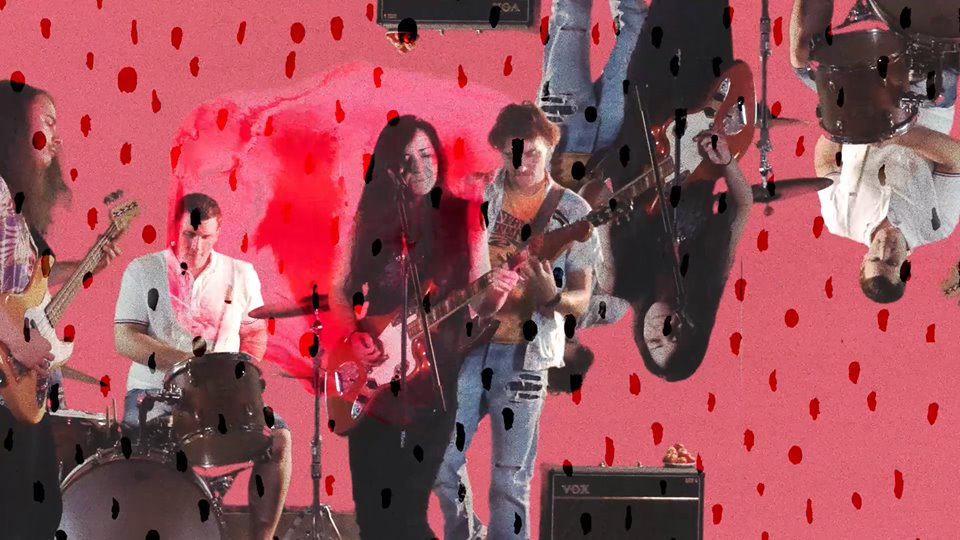
Oftentimes I have sketches written down and they stay there for months or even years. Some of them get rediscovered and make their way into a song when the time seems right.
Jenell: Restraint is something many bands seem to lack, yet you come across with an innate ability to know not to let the needle jump into the red, understanding that it’s counterproductive to move in too many directions at once.
Julia: Thanks a lot, yes, I just can say that I can very much relate to that.
Jenell: A peek into your creative process please, digital or analog? Is your approach to laying down music a building block process?
Julia: Yes, very much. I start going digital very early, recording the basis of the song to see if it works and with which drumbeat it works best, it’s all a matter of trial and error.
Jenell: Your music has a timeless quality to it, is that quality important to you?
Julia: Hmm … no, I didn’t really think about that. I just create what I find awesome myself. It’s a very intuitive thing. Of course I sometimes thought “I want to do a song like this” but overall, there’s no plan behind it to make it appeal to a certain group of people.
Jenell: While your psych influence many be vast, you delicately lace those aspects into your music without allowing the music to become sonically dense, leaving it room to breathe and be entirely expansive.
Julia: Yes, I suppose this is quite uncommon. Often I struggle to see this as a good quality. I often think: ”Oh they won’t book you because the music’s just not powerful enough or maybe boring for all the people who love the harder stoner rock type of music.” But I can’t and don’t want to change anything because of that. These were also fears that kept me from playing live for a very long time in the first place. I couldn’t imagine that my music would be good enough for the stage. Now I’m so glad I got over that … I hope the live shows just have some appeal on a variety of levels.
Jenell: The bass-lines you lay down are rather complex, especially on ‘Strawberry Shake’, belaying a sense of warmth. What drew you to consider the bass as far more than a backbeat?
Julia: You can use the bass in such awesome ways that it’s just lazy to reduce it to keynotes and rhythm support. I always try to find the sweet spot between the bass playing the role it should and at the same time, being noticeable in doing something interesting.
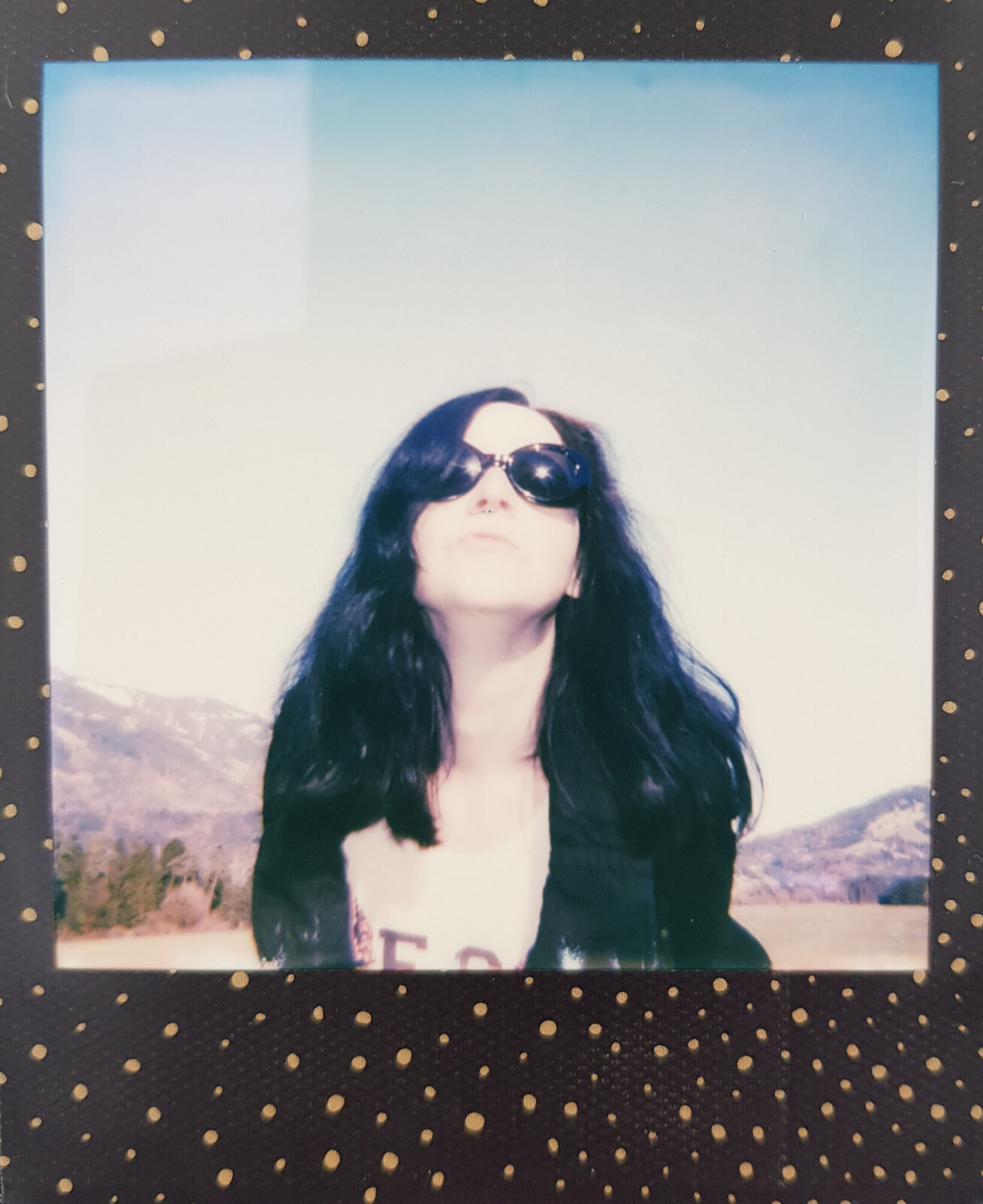
Jenell: Do you find yourself to be a perfectionist, in control, or do your ideas lead you, taking on a life of their own?
Julia: I am very much in control and also a perfectionist. I think a lot, certainly too much. But in general, ideas need to be channelled and refined. An idea is like the basis of a house, it can be already nice but why not make it awesome? You need ideas and spontaneity for the initial spark, but I don’t think this is enough to make something really good. I have found that for myself, I need to do something properly, otherwise I quickly label something as a waste of time and this is very uncomfortable. Wasted time is better spent working on something awesome.
I like to the best of both worlds … starting to work on a song, then lay it aside and rest. In so doing the song becomes enriched by the next bunch of good ideas from a fresh brain. Of course this is a strength and also a weakness at the same time. I have to watch closely that there’s still enough room to let go, to relax and just enjoy the moment, especially when working in the band, as I want them to enjoy and have a good time while feeling comfortable.
I’ve also had moments in which I was thankful for the more chaotic, spontaneous people in my life, as they made things possible for me that I couldn’t have achieved on my own.
To sum it up, if you know the story of Lee Mavers, which I tend to relate to, his kind of mentality and what made him fail in the end, is something I’ll take as a kind of warning.
Jenell: I have to talk a moment to comment on your album artwork, which has always been dreamy … is there a backstory to the feather, and where has the feather gone?
Julia: When I made that logo, it was at a very early stage when I didn’t have a lot of expectations or a distinctive plan for Juleah. Actually for me as a musician, it’s annoying to fuss about these business things, asking myself which kind of feeling I want to convey, with the logo having to represent my image and bla bla bla … things like these should be given to graphic designers and promotional people or at least made in collaboration with them because they just know better how to express those promotional aspects.
At the time I didn’t have anyone like that, so I picked this symbol rather intuitively. I don’t know if I can explain it well but … the feather represents a bird and the bird is floating just like the music. Then there was my mother who once told me that “If you find a feather lying on the floor it will bring you luck”. I don’t know where exactly she got that from. I believe it has a religious origin. I think that notion might have played a role in picking this symbol. The reason I let go of the feather logo was not so much because of the feather, but because of the font which is now used by every other psychedelic band, and I just wanted to have something new.
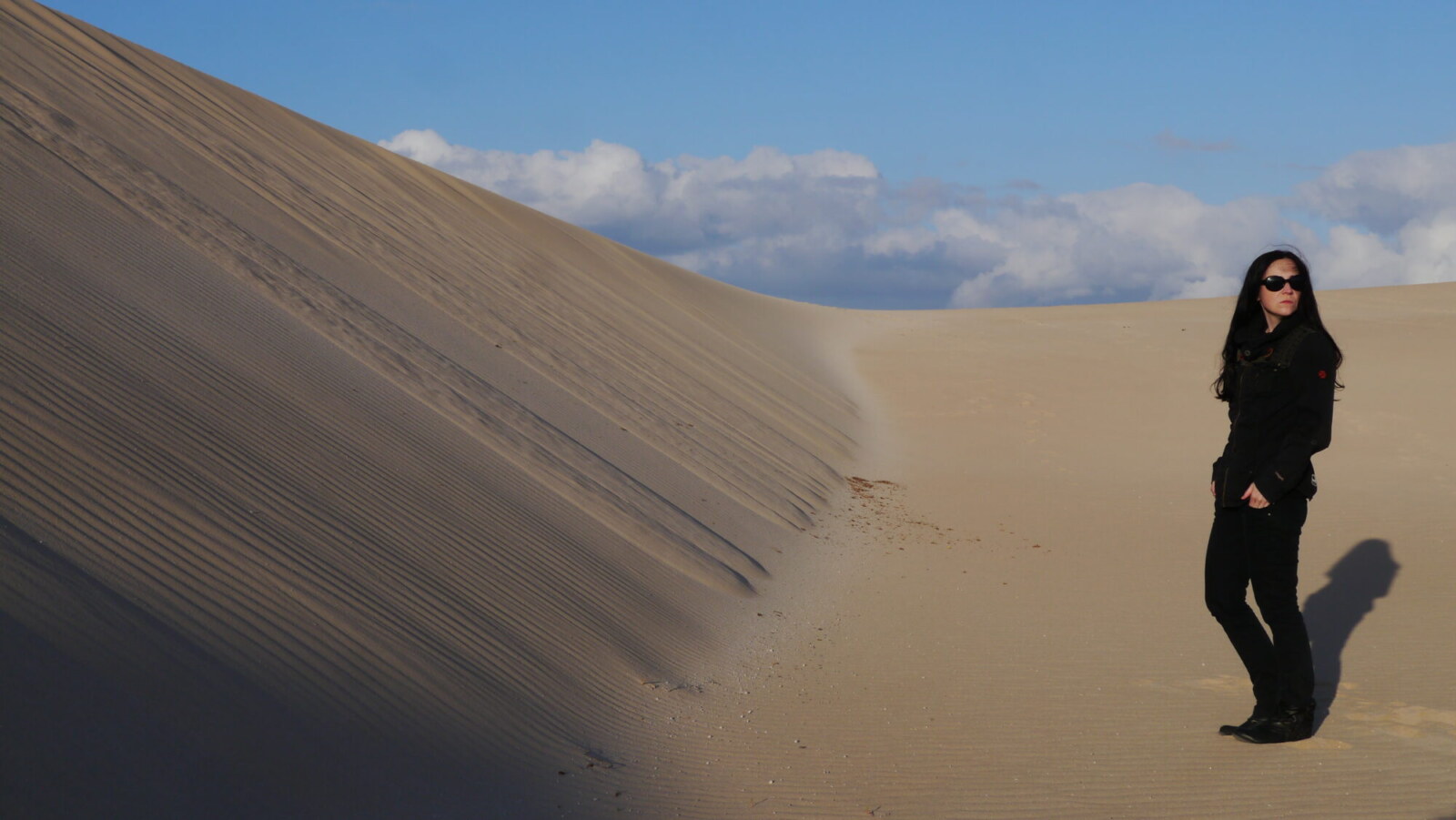
Jenell: The new album from Juleah, entitled ‘Desert Skies’ and is available now. Thanks for letting me bend your ear. Is there anything I’ve missed? And where can folks find you on the worldwide-web?
Julia: I’m easy to find on all the big platforms.
Please just don’t confuse me with the other Juleah out there who does Christian music.
I want to thank Jenell you for your interesting questions and the great work you do … helping to bring the music to the listeners!
Jenell Kesler
Juleah Official Website / Facebook / Instagram / Twitter / Bandcamp / YouTube / Spotify / SoundCloud



